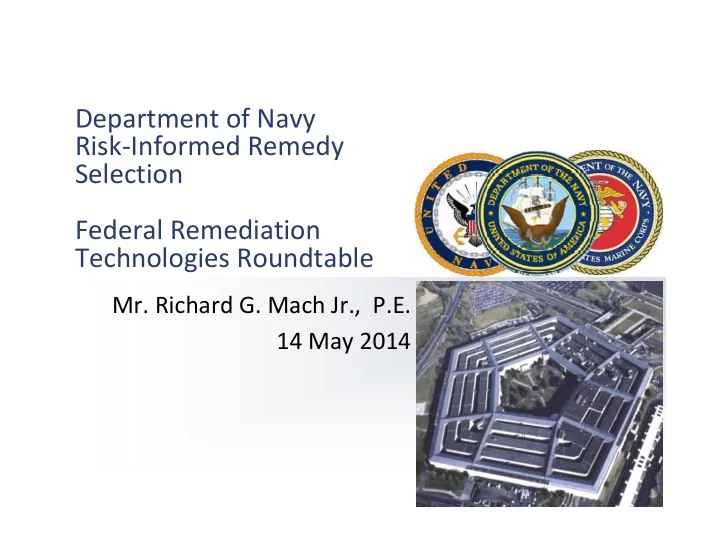

Department of Navy Risk ‐ Informed Remedy Selection Federal Remediation Technologies Roundtable Mr. Richard G. Mach Jr., P.E. 14 May 2014
Department of Navy Decades of Optimization Policy 2
Key References Groundwater Risk Management Handbook, NAVFAC 2008 Guidance for Optimizing Remedy Evaluation, Selection, and Design, NAVFAC, 2010 Navy Optimization Policy, NAVFAC 2012 Use internet search or: http://www.navfac.navy.mil/navfac_worl dwide/specialty_centers/exwc/products_ and_services/ev/er/erb/gpr.html 3
Navy’s Toolbox Approach Site Evaluation / CSM Focus on GW useability and complete exposure pathways Risk Management Plume Management Zones, Point of Compliance Remediation Strategies Treatment Trains, Active vs. Passive, Containment , MNA as polishing technology Optimization / Sustainability New Tools Mass flux Plume stability/MNA software 4
Typical Alternative Approaches to Groundwater Remediation Groundwater plume management Some states allow for plume management zones, alternate groundwater classification, alternate concentration limits (risk ‐ based) Containment systems (focus on plume migration control through pumping or permeable barriers) Treatment + MNA over long time frames Treat source/hot spots to extent practicable followed by MNA (often with extend timeframes) and/or other passive remediation technologies Land ‐ use controls to manage potential exposure during remediation 5
Performance Objectives and Exit Strategies Goals Select remediation approach to achieve objectives Define clear end ‐ point Conc. Conc. $/KG $/KG Performance Objectives Need to be developed and clearly defined Functional objectives should be specific, measurable, attainable, relevant, and time ‐ bound (SMART) Exit Strategies When time to stop, modify, or change technology “Asymptote” and “$/kg removed” important Identify appropriate times to transition to other components of the treatment train 6
Example Navy Project ‐ Bethpage, NY 7
Background Naval Weapons Industrial Reserve Plant (NWIRP) Bethpage government ‐ owned contractor ‐ operated (GOCO) facility was established in the 1940’s to build Navy aircraft (originally 109 acres) Northrop Grumman (NG) operated the NWIRP as contractor; also owned and operated its own facility adjacent to NWIRP (500 +/ ‐ acres) Releases occurred over 50 years, and site is complicated by number of other PRPs South Oyster Bay (Atlantic Ocean) is the ultimate receptor Zones of sand and gravel promote non ‐ uniform migration of chlorinated VOCs Plume is over 3 miles long, 750 feet deep, and fragmented near southern extent 8
9
Remedy Overview Remedial Actions have consisted of: Early treatment of concentrated source area via in ‐ situ treatment (OU1) Early implementation of plume containment at the facility boundary (IRM and OU2) Off ‐ property installation of hotspot system for mass removal (VOCs > 1 ppm) (OU2) Extensive monitoring system and provisions for well head treatment at impacted public water supply (PWS) systems (OU1 and OU2) 10
Groundwater Conceptual Site Model Plumes are relatively well defined, concentrated, and continuous near NWIRP Bethpage/NGC Plume becomes discontinuous in downgradient areas and moves as separate fingers CSM – Plume is 3-Dimensional CSM - Pubic Water Supply Well Field (WF) 11
Hot Spot Treatment System Constructed in an off ‐ property residential area, on property leased from Town of Oyster Bay Design, easements, construction required 6 years and $14M. System anticipated to run for 5 to 10 years System started in 2009 and has removed 3.5 tons of VOCs In 2010, OMM was approximately $700K/yr (3,000 pounds of VOCs or $230/lb) In 2013, OMM was approximately $600K/yr (1,300 pounds of VOCs or $460/lb) 2013 Optimization Study prepared to: Improve performance and reliability Continue to reduce operating costs Define metrics for system shutdown, not well defined in ROD 12
Off ‐ Property Groundwater Monitoring Consists of plume monitoring and PWS sentry wells Plume is very complex, with multiple semi ‐ confining units and fragmenting of plume from multiple releases over 50 years and seasonal pumping by PWS’ Plume encompasses over 3000 acres and to depths of 750 feet. Delineation of plume is complicated by several non ‐ Navy sources in the area and similarity of VOCs used Drilling in residential areas involves significant community interaction 13
PWS Well Head Treatment Navy is negotiating and/or has implemented well treatment for three public water suppliers Bethpage Water District (BWD) – 2 plants South Farmingdale Water District (SFWD) – 2 plants New York American Water (NYAW) – 1 plant Total of 14 well fields may be impacted Dealing with water districts can be challenging, involves: Legal agreements Extensive community involvement Political pressure 14
Off ‐ Property Optimization 2011, Navy assembled team of third ‐ party experts to evaluate effectiveness of offsite OU2 GW remedy One of the findings presented in Optimization Report (June 2011) recommended an evaluation of alternatives for managing impacted groundwater. Alternatives report completed in Jan 2012 2012, independent review of Alternatives Report was conducted by Battelle, USGS, and USACE, all concluded the Alternative Report was “technically sound” (May 2012) 15
Off ‐ Property Optimization Based on these evaluations, the Navy concluded that the overall approach presented in the OU2 ROD: Remains protective of human health and the environmental through monitoring and well head treatment Complies with Federal and State regulations Is cost effective, at least among the options available Uses permanent solutions to the maximum extent practical Utilizes treatment to the maximum extent practical 16
Off ‐ Property Optimization As a result of the evaluations and based on ten years of implementation experience, specific technical details of the program were modified to optimize performance, including: Increased plume monitoring to better develop CSM and allow accurate predictions of potential plume migration Enhanced sentry well network around potentially impact PWS’ Use of existing infrastructure, where reasonable, to achieve mass removal and thereby reduce or delay potential impacts to PWS’ Use of MNA for portions of the plume that will bypass PWS’ and not effect human health or the environment 17
18
Recommend
More recommend